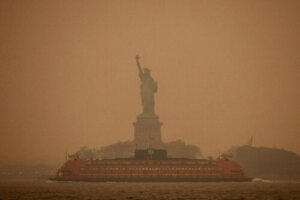New York Breathes Air Polluted by Canadian Wildfires: Learn About the Risks


Reviewed and approved by the doctor Leonardo Biolatto
New York is on alert due to the risks of breathing air contaminated by the devastating Canadian wildfires. Last Tuesday, the Big Apple’s iconic skyscraper skyline was shrouded in a dense haze of smoke, accompanied by a potent odor.
The New York State Department of Environment has responded to this situation with warnings that remain in effect until midnight Wednesday. It has advised minimizing outdoor activities, especially for the most susceptible people (those with lung and heart disease, children, and the elderly).
Exposure to this type of pollution poses serious health risks. In this post, we’ll delve into them and provide recommendations to protect ourselves at times like this.
Air quality health warning: If you’re in New York and have heart or respiratory problems, be careful when going outside. Smoke from Canadian wildfires is affecting the city’s air. Stay indoors as much as you can for your safety.
What is the smoke from Canadian wildfires and why can it make you ill?
The smoke generated by the combustion of wood and other organic materials is a complex combination of gases and fine particles. However, it’s the latter that poses the greatest threat to our health.
Polluted air contains a variety of harmful substances, including benzene, formaldehyde, acetaldehyde, acrolein and polycyclic aromatic hydrocarbons (PAHs). According to the Centers for Disease Control and Prevention (CDC), exposure to smoke from wildfires can cause problems in healthy people.
Read more: How To Do a Lung and Bronchial Cleanse
Breathing air polluted by wildfires can cause the following:
- Coughing
- Runny nose
- Asthma attack
- Headaches
- Difficulty breathing
- Itchy eyes and throat
- Rapid heartbeat
Health effects from wildfire smoke can vary depending on the duration of exposure, air pollutant concentration, and individual sensitivity.
Know the risks of breathing air contaminated by wildfires
Let’s explore the different risks associated with breathing air contaminated by wildfires:
- The body’s ability to eliminate foreign agents is affected. The U. S. Environmental Protection Agency (EPA) gives the latest information about the Canadian wildfires and reports that the presence of fine particles in the air can hinder the lungs’ ability to clear viruses and bacteria.
- It increases the risk of respiratory and cardiovascular disease. Again, the EPA stresses that continuous exposure to these particles for days or weeks is associated with an increased risk of pathologies or aggravation of pre-existing conditions.
- Increased emergency consultations. A study published in the journal Annals of the Royal National Academy of Pharmacy., in 2018, found that exposure to smoke from wildfires was associated with an increase in visits to health centers, hospitals, and emergency departments.
Who is most affected?
According to the Washington State Department of Health, the population most affected by wildfire smoke is as follows:
- Patients with heart and lung disease, such as congestive heart failure, chronic obstructive pulmonary disease, emphysema, and asthma. Also, those who have suffered a myocardial infarction.
- Older adults, as they may have undiscovered diseases.
- Children, as their lungs and airways are still developing.
- Pregnant women, because they inhale more air per kilogram of body weight than other people.
- Smokers. This group has depressed lung function.
- People with active respiratory infections, such as colds or flu.
- People who have had a stroke.
- Patients living with diabetes.
Read more: Smoker’s Melanosis
People who have had COVID-19 may experience greater difficulties in coping with exposure to air pollution. It is, therefore, crucial that these patients are aware of this vulnerability and take additional measures.
Tips to avoid breathing air contaminated by forest fires
It’s essential to be aware of the risks and take appropriate precautions to protect your health when you’re exposed to smoke from forest fires. Let’s take a look at some tips to avoid breathing air contaminated by wildfires:
- Pay attention to local air quality reports. Stay tuned to community news and alerts.
- Use air conditioning. It’s important to change your filter regularly.
- Avoid exercising outdoors if there’s smoke in the air.
- Stay in places with closed doors and windows.
- Don’t light candles, fireplaces, or gas stoves.
Faced with the reality of wildfires and air pollution, we must recognize the importance of protecting our health. Inhalation of smoke from these disasters poses serious risks to our well-being and health. These aren’t only limited to respiratory problems, but also affect general health.
Taking precautionary measures, such as limiting exposure to polluted air and following the directions of health authorities, becomes critical in these scenarios. We must prioritize health amidst the challenges.
Main image: Amr Alfiky/Reuters.
All cited sources were thoroughly reviewed by our team to ensure their quality, reliability, currency, and validity. The bibliography of this article was considered reliable and of academic or scientific accuracy.
- Agencia de Protección Ambiental de Estados Unidos. (4 de noviembre de 2022). Cómo puede afectar la salud el humo de los incendios. Consultado el 7 de junio de 2023, https://espanol.epa.gov/espanol/como-puede-afectar-la-salud-el-humo-de-los-incendios
- Cancelo-González, J. J., & Díaz-Fierros Viqueira, F. (2018). Incendios forestales y salud pública. Anales de la Real Academia Nacional de Farmacia 84(3), 289-300. https://dialnet.unirioja.es/servlet/articulo?codigo=6671941
- Centros para el Control y la Prevención de Enfermedades. (27 de diciembre de 2013). Wildfire Smoke. Consultado el 7 de junio de 2023, https://www.cdc.gov/disasters/wildfires/smoke.html
- Departamento de Salud Estatal de Washington. (s.f.). Humo de Incendios Forestales. Consultado el 7 de junio de 2023, https://doh.wa.gov/community-and-environment/air-quality/smoke-fires/humo-de-incendios-forestales
- Departamento de Salud Estatal de Washington. (2012). How wood smoke harms your health. https://apps.ecology.wa.gov/publications/publications/91br023.pdf
This text is provided for informational purposes only and does not replace consultation with a professional. If in doubt, consult your specialist.








